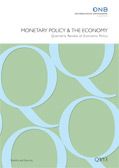Monetary Policy and the Economy Q1/15
 OeNB
OeNB
- published:
- March 2015.
 OeNB
OeNB
Austria: Economic Growth in 2014 at 0.4% (PDF, 403 kB) Ragacs, Rumler, Schneider. Ragacs, Rumler, Schneider – Monetary Policy and the Economy Q1/15 en Mar 31, 2015, 12:00:00 AM
Determinants of Inflation Perceptions and Expectations: an Empirical Analysis for Austria
(PDF, 269 kB)
Fritzer, Rumler.
Fritzer, Rumler – Monetary Policy and the Economy Q1/15
This study uses micro data from a survey among 2,000 Austrian households conducted in
2013 to investigate the socioeconomic determinants of inflation perceptions and expectations.
In our econometric analysis, we find that socioeconomically disadvantaged respondents (less
income, lower educational attainment) and older interviewees tend to have higher inflation
perceptions. In contrast, respondents living in larger households or in agglomerations with
more than 5,000 inhabitants have lower inflation perceptions. As to inflation expectations, we
find that older and less educated people tend to report higher inflation expectations. Additionally,
we document that women tend to have higher inflation expectations than men and that
knowledge of the Eurosystem’s definition of price stability dampens inflation expectations.
Moreover, respondents who are skeptical about the reliability of the official inflation indicators
state higher inflation expectations. As largely correct and realistic inflation perceptions and
expectations are important for the credibility of monetary policy, these results suggest that
financial education strategies should be focused on population groups with lower educational
attainment, less income and on younger people.
en
inflation perceptions, inflation expectations, socioeconomic characteristics, survey data
C25, E31, J10
Mar 31, 2015, 12:00:00 AM
Impact of Inflation on Fiscal Aggregates in Austria
(PDF, 631 kB)
Prammer, Reiss.
Prammer, Reiss – Monetary Policy and the Economy Q1/15
In Austria, temporary shocks to inflation (with unchanged real macroeconomic developments)
impact the primary balance, i.e. the overall budget balance excluding interest payments,
mainly via taxes and transfers whose brackets or rates are not indexed to inflation. Even
though the overall effect of such shocks on budget balances would be very small in Austria,
below-average inflation, for example, is still negative from a government’s viewpoint because
it significantly raises the public debt ratio. Lower inflation moreover depresses the gains made
from both bracket creep and the devaluation of nominally fixed transfers, which is, however,
somewhat compensated for by decreasing interest payments. Households, by contrast, benefit
from lower inflation as it causes their net tax burden to go down.
en
bracket creep, inflation indexation, Austria, social benefits
E62, H60
Mar 31, 2015, 12:00:00 AM
Housing Markets in Austria, Germany and Switzerland
(PDF, 488 kB)
Schneider, Wagner.
Schneider, Wagner – Monetary Policy and the Economy Q1/15
Running counter to the sharp rise in house prices and housing wealth observed since the
mid-
1990s in the vast majority of European countries, real house prices in Germany and
Austria were going down in this period and did not start to rise until 2010 or 2007, respectively.
This reflects national idiosyncracies in housing markets and motivated the discussion of
relevant peculiarities in, and similarities among, Austria and Germany as well as Switzerland.
Among the most important structural features that ensured housing market stability in these
three countries during the last decade are well-developed rental markets, low homeownership
ratios and conservative lending standards. While the tax systems of Germany and Austria do
not encourage indebtedness, Swiss taxpayers benefit from taking on a lot of leverage. Recent
house price increases in all three countries under review here can be attributed to various
crisis-
related channels (extremely low interest rates, economic uncertainty, safe-haven effect)
as well as to demographic developments, including immigration. The Swiss authorities have
already implemented a number of macroprudential measures to safeguard the banking sector.
en
house prices, rental markets, housing finance, taxation
R31, E32, E44
Mar 31, 2015, 12:00:00 AM